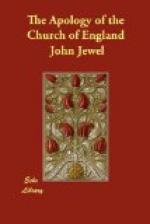“Our Church,” say they, “cannot err.” They speak that, I think, as the Lacedaemonians long since used to say, that it was not possible to find any adulterer in all their commonwealth: whereas indeed they were rather all adulterers, and had no certainty in their marriages, but had their wives common amongst them all: or as the canonists at this day, for their bellies’ sake, used to say of the Pope, that forsomuch as he is lord of all benefices, though he sell for money bishoprics, monasteries, priesthood, spiritual promotions, and part with nothing freely, yet, because he counteth all his own, “he cannot commit simony, though he would never so fain.” But how strongly and agreeably to reason these things be spoken, we are not as yet able to perceive, except perchance these men have plucked off the wings from the truth; as the Romans in old time did prune and pinion their goddess Victoria, after they had once gotten her home, to the end that with the same wings she should never more be able to flee away from them again. But what if Jeremy tell them, as is afore rehearsed, that these be lies? What if the same prophet say in another place that the selfsame men, who ought to be keepers of the vineyard, have brought to nought and destroyed the Lord’s vineyard? How if Christ say that the same persons, who chiefly ought to have care over the temple, have made of the Lord’s temple a den of thieves? If it be so that the Church of Rome cannot err, it must needs follow, that the good luck thereof is far greater than all these men’s policy. For such is their life, their doctrine, and their diligence, that for all them the Church may not only err, but also utterly be spoiled and perish. No doubt, if that church may err which hath departed from God’s words, from Christ’s commandments, from the Apostles’ ordinances, from the primitive Church’s examples, from the old fathers’ and councils’ orders, and from their own decrees, and which will be bound within the compass of none, neither old nor new, nor their own nor other folks’, nor man’s law nor God’s law, then it is out of all question that the Romish Church hath not only had power to err, but also that it hath shamefully and most wickedly erred in very deed.




